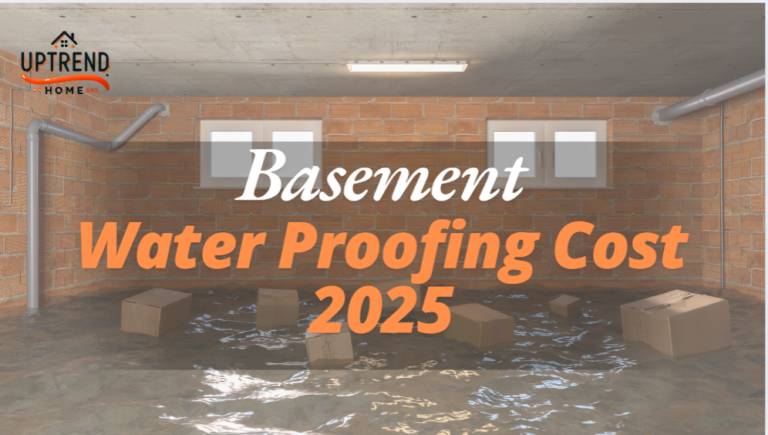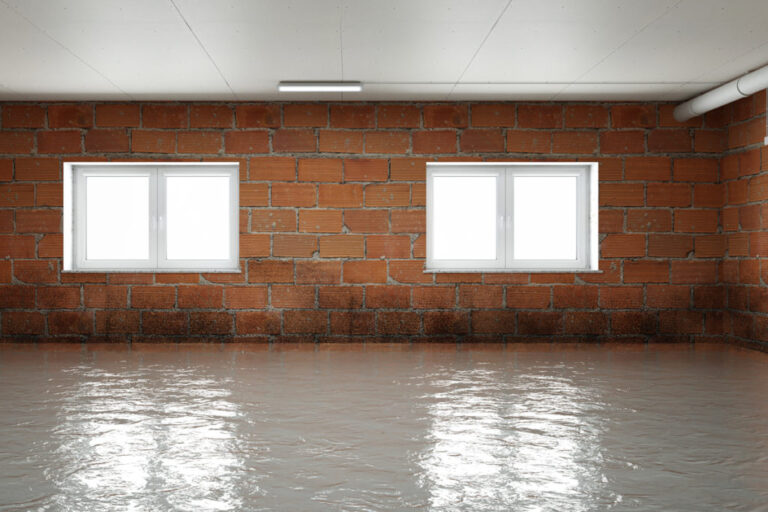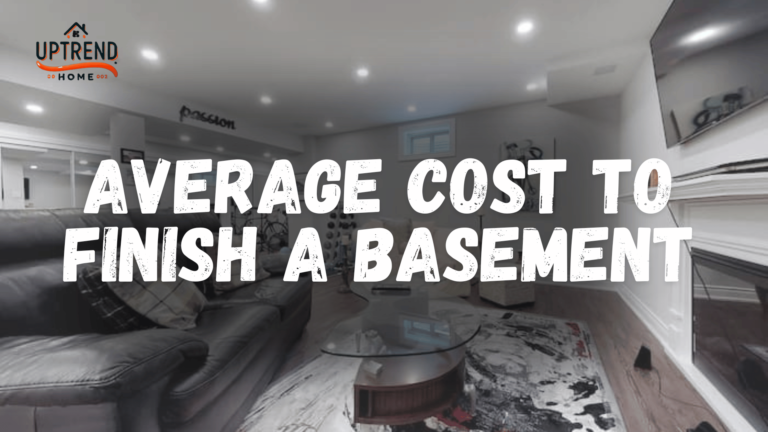Basement Foundation Cost Calculator: Estimate Your Construction Expenses
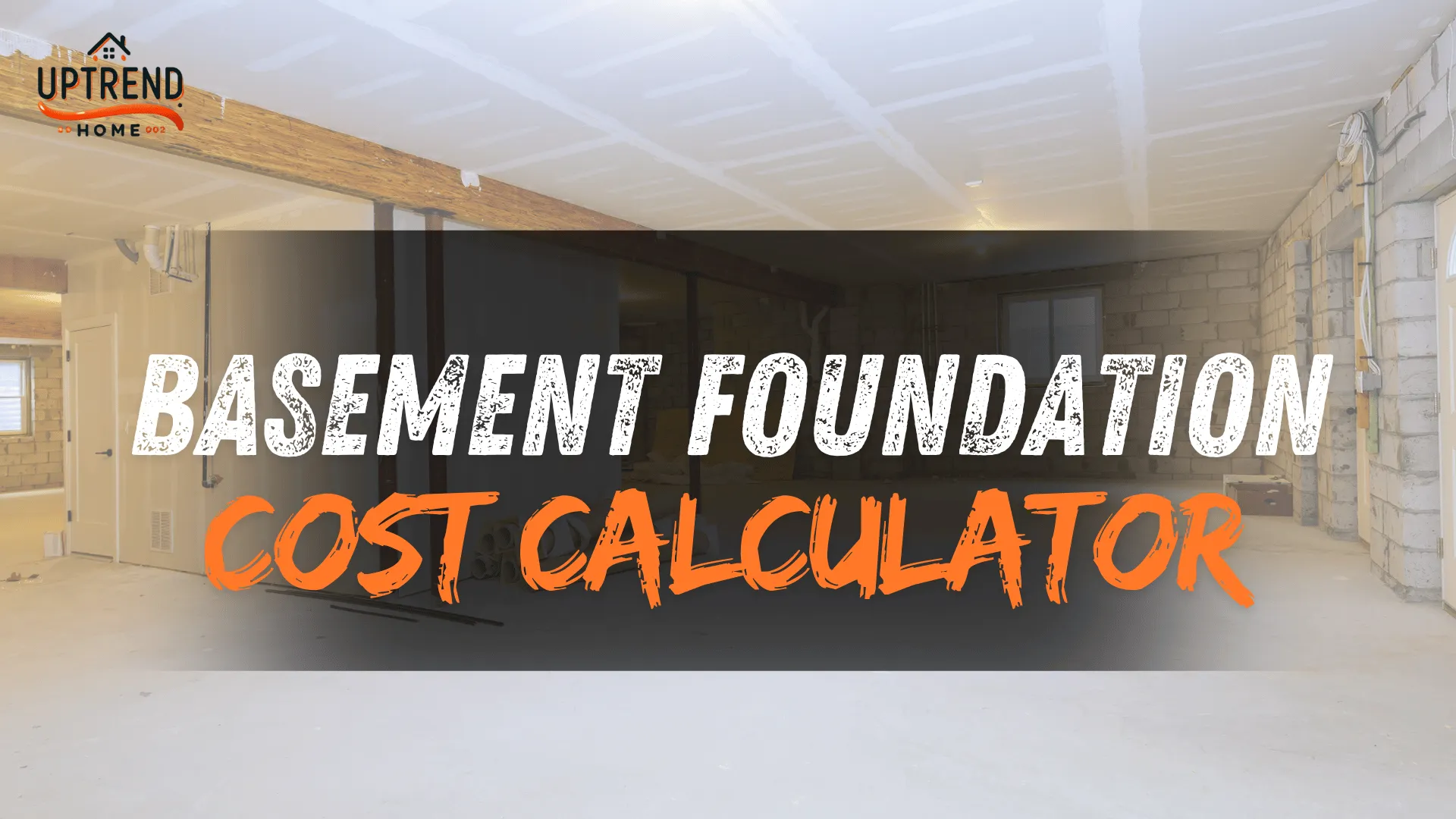
Basement Foundation Cost Calculator
When planning to build or renovate a home, the cost of a basement foundation is one of the most significant expenses to consider. Basement foundations are an excellent choice for homeowners who need additional living or storage space while also providing strong structural support for the building. However, understanding and estimating the costs can be a complex process.
Our Basement Foundation Cost Calculator simplifies this task by giving you a clear, accurate cost estimate based on various factors such as the size of your basement, soil conditions, and local construction rates. Whether you’re budgeting for a new home or adding a basement to an existing structure, this calculator can help you make informed decisions.
The costs for a basement foundation can range widely. On average, expect to pay between $70,000 and $100,000+ for a 2,000-square-foot basement. This range depends on factors like excavation requirements, waterproofing systems, drainage installation, and materials used. Additionally, labor costs and local market rates can have a significant impact on the overall price.
Using our calculator, you’ll gain insight into the potential expenses for:
- Excavation and grading.
- Concrete pouring and reinforcements.
- Waterproofing and insulation.
- Any optional upgrades, such as finishing the basement.
A Basement Foundation Cost Calculator is not just about numbers—it’s about empowering homeowners to plan better, save money, and avoid unexpected costs during construction. Ready to get started? Enter your details and let our calculator guide you toward building a solid and reliable foundation!
How to Calculate Basement Foundation Costs
Calculating the cost of a basement foundation involves several key factors that can significantly influence the final price. Understanding these elements will help you accurately estimate the total cost and avoid unexpected expenses during the project. Below, we break down the most important factors to consider when calculating basement foundation costs.
Factors Affecting Basement Foundation Costs
Size of the Basement
The size of your basement is one of the most influential factors in determining the cost of the foundation. Larger basements require more materials, labor, and time, all of which can increase the total cost. Typically, the larger the space, the higher the cost per square foot. For example, a 2,000-square-foot basement will cost significantly more than a 1,000-square-foot space, even when all other factors are constant.
Soil Conditions and Preparation
Soil conditions play a crucial role in determining the complexity and cost of your foundation. For instance, rocky or unstable soil requires additional preparation, such as excavation or reinforcement, which can increase costs. In contrast, stable soil is easier to work with and less expensive to prepare for foundation work. Poor soil conditions may also require the use of specialized materials or equipment, driving up the cost of the project.
Labor and Material Costs
Labor and material costs vary significantly depending on your location and the type of foundation materials used. Concrete, for example, is the most common material for basement foundations, but there are different types of concrete and reinforcement methods, each affecting the overall price. Labor costs also fluctuate based on local wages, the complexity of the job, and the number of contractors needed.
Excavation and Grading Costs
Excavation and grading are essential parts of the basement foundation process, particularly if your site requires leveling or removal of obstacles like trees or rocks. These costs can range significantly depending on the terrain, depth of excavation needed, and equipment required. Excavation costs can add thousands of dollars to the total cost of the foundation, especially if the soil is difficult to work with or if your site is sloped.
Cost Estimation per Square Foot
Once the key factors are determined, the cost of your basement foundation can be calculated per square foot. On average, a basement foundation costs $35 to $50 per square foot, depending on the specifics of your project. For example, if your basement is 2,000 square feet, the cost could range from $70,000 to $100,000+. Keep in mind that additional costs may apply if you choose to finish the basement, waterproof it, or add features like insulation or custom designs.
By understanding these variables and using the right tools to estimate your costs, you can better plan your budget and ensure that your basement foundation project stays on track financially.
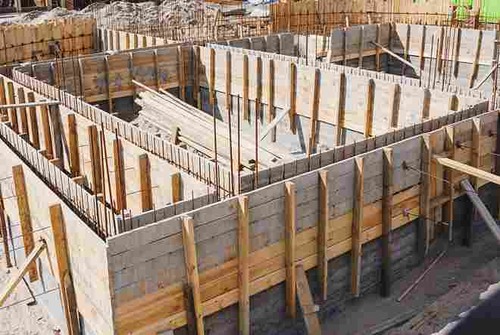
Average Costs of a Basement Foundation
Understanding the average costs of a basement foundation can help you plan your project and avoid financial surprises. The total cost of your basement foundation will depend on whether the space is unfinished or finished, as well as the size of the basement. Below is an overview of the typical costs you can expect for different types of basement foundations.
|
Basement Foundation Type |
Cost per Square Foot |
Total Cost for 2,000 Sq Ft |
|---|---|---|
|
Unfinished Basement |
$35 – $50 |
$70,000 – $100,000 |
|
Finished Basement |
$50 – $75 |
$100,000 – $150,000 |
|
Walkout Basement |
$50 – $75 |
$100,000 – $150,000 |
|
Daylight Basement |
$45 – $60 |
$90,000 – $120,000 |
|
Partial Basement |
$40 – $55 |
$80,000 – $110,000 |
Typical Cost Range for Unfinished Basements
For an unfinished basement, the cost primarily reflects the excavation, foundation construction, and basic waterproofing. On average, you can expect to pay $35 to $50 per square foot for an unfinished basement foundation. For a standard 2,000-square-foot basement, this will range from $70,000 to $100,000 depending on factors like site preparation and local labor rates. This cost typically includes pouring the foundation walls, installing footings, and basic waterproofing measures.
Unfinished basements are a popular choice for homeowners looking to keep costs down while still gaining valuable space for storage or future expansion. However, these costs can rise significantly if additional drainage systems, soil stabilization, or complex designs are required.
Additional Costs for Finished Basements
If you choose to finish your basement, the costs will increase due to the added work of framing, flooring, plumbing, electrical systems, insulation, and more. Typically, finishing a basement adds $30 to $50 per square foot to the initial foundation cost. For a 2,000-square-foot basement, this translates to an additional $60,000 to $100,000.
Finishing your basement not only adds usable living space but can also increase the overall value of your home. However, the additional costs for electrical work, drywall, flooring, and insulation can make it a significant investment. Waterproofing and ventilation systems will also need to be considered to ensure the space remains dry and comfortable, which can further increase the price.
Cost Comparison by Basement Size (1,000 to 3,000 sq ft)
The size of your basement will directly influence the total cost of your foundation. Below is a general comparison of costs for various basement sizes:
- 1,000 sq ft basement:
- Unfinished: $35,000 to $50,000
- Finished: $65,000 to $100,000
- 1,500 sq ft basement:
- Unfinished: $52,500 to $75,000
- Finished: $82,500 to $125,000
- 2,000 sq ft basement:
- Unfinished: $70,000 to $100,000
- Finished: $100,000 to $150,000
- 2,500 sq ft basement:
- Unfinished: $87,500 to $125,000
- Finished: $125,000 to $187,500
- 3,000 sq ft basement:
- Unfinished: $105,000 to $150,000
- Finished: $150,000 to $225,000
These costs reflect the foundation work and finishing costs separately, and the price will vary depending on the complexity of the project, local labor rates, and your chosen materials. The larger the basement, the greater the total cost, but the cost per square foot may decrease slightly as the basement size increases.
By factoring in the size and whether you plan to finish the basement, you can better estimate your total investment in this important part of your home.
Types of Basement Foundations and Their Costs
Basement foundations come in various types, each suited for different site conditions, preferences, and project goals. The type of basement foundation you choose will significantly affect the overall cost, design, and functionality of the space. Below is an overview of the most common types of basement foundations and their associated costs.
Full Basement
A full basement is the most traditional and common type of basement foundation. It typically involves excavating a large area beneath the entire home to create a complete living or storage space below ground level. Full basements provide the most versatility in terms of usable space and are ideal for adding extra living areas, storage, or even a home theater, gym, or guest suite.
- Cost Range: $35 to $50 per square foot
- Typical Total Cost: For a 2,000-square-foot full basement, the cost ranges from $70,000 to $100,000.
- Features: Includes poured concrete walls and footings, a full floor, and typically waterproofing systems to prevent moisture issues. Costs can increase based on the complexity of the design, excavation depth, and the addition of features like plumbing and electrical systems.
Walkout Basement
A walkout basement is built into a hillside or slope, allowing one side of the basement to have full access to the outdoors via a door or set of windows. This type of foundation is ideal for properties with uneven terrain and provides natural light and ventilation to the basement area. It’s commonly used in regions with a lot of hilly or mountainous land.
- Cost Range: $40 to $60 per square foot
- Typical Total Cost: For a 2,000-square-foot walkout basement, the cost is typically between $80,000 and $120,000.
- Features: Walkout basements typically require more extensive excavation due to the need for creating access to the outdoors. These basements may also need special grading and drainage solutions, which can increase overall costs.
Daylight Basement
A daylight basement is similar to a walkout basement but may not provide as much direct access to the outdoors. This type of basement usually has one or more sides that are above ground, allowing natural light to flood into the space. It is a great option if you want a basement that feels more open and inviting without fully exposing the lower level of the home to the outside.
- Cost Range: $35 to $55 per square foot
- Typical Total Cost: For a 2,000-square-foot daylight basement, the cost will range from $70,000 to $110,000.
- Features: Similar to the walkout basement, daylight basements are built into sloping or elevated land, allowing for more sunlight and ventilation. Depending on how much of the basement is above ground, you may need additional retaining walls or structural support.
Partial Basement
A partial basement refers to a basement that covers only part of the home, typically due to site limitations or design preferences. This type of foundation is often chosen when a full basement is not necessary or when budget constraints are a factor. It can be ideal for smaller homes or areas with less need for additional living space.
- Cost Range: $30 to $50 per square foot
- Typical Total Cost: For a 1,000-square-foot partial basement, the cost will range from $30,000 to $50,000.
- Features: A partial basement generally includes only partial excavation and construction of foundation walls. The cost will vary depending on the area of the home covered and whether any special engineering is required. Partial basements are generally more affordable, but they also offer limited usable space compared to a full basement.
These are just a few examples of the most popular basement foundation types. The type of basement you choose will depend on your budget, site conditions, and how much usable space you need. Be sure to consider both the functional and aesthetic aspects of each option to find the best fit for your home and future plans.
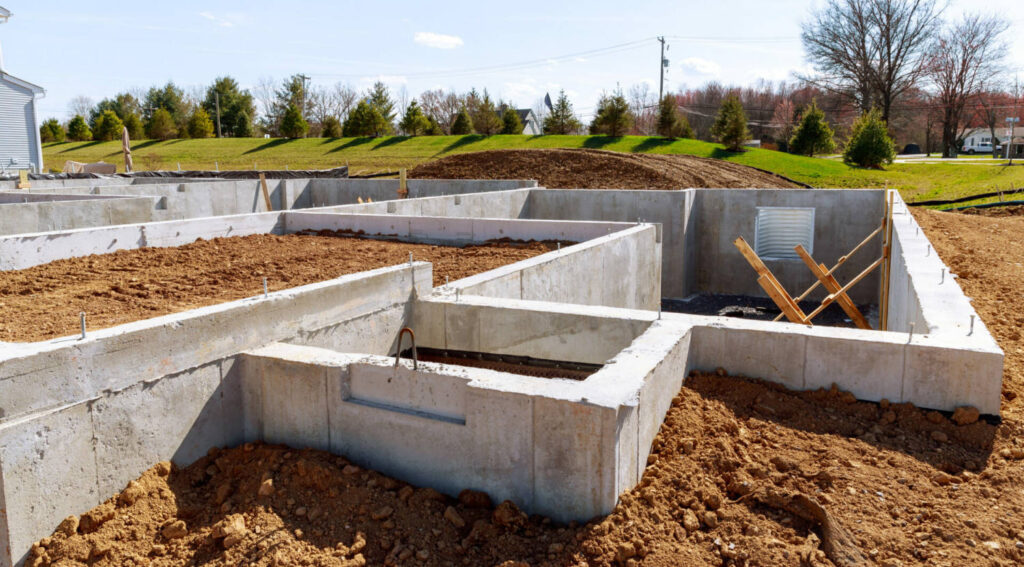
What Influences Basement Foundation Costs?
The cost of building a basement foundation can vary widely depending on several factors. Understanding what influences basement foundation costs is crucial to budgeting for your project. Here are the key factors that affect the cost of a basement foundation:
Excavation Depth and Challenges
The depth of the excavation and the specific challenges posed by the site can significantly impact the cost of a basement foundation. Shallow foundations are generally more affordable, while deep basements or those built on uneven terrain require more complex excavation. If the soil is particularly rocky, compacted, or difficult to work with, it can increase labor and equipment costs.
- Cost Implications: More extensive excavation often requires the use of heavy machinery, specialized labor, and additional time, all of which increase the cost of the foundation.
- Challenges: Sites with hard rock, water drainage issues, or other obstacles may require additional steps to address these complications, raising the overall price.
Waterproofing and Drainage Systems
Waterproofing is a critical aspect of any basement foundation, especially in areas prone to high moisture or flooding. Proper waterproofing and effective drainage systems, including sump pumps and French drains, are essential to prevent water damage, mold, and structural issues in the future.
- Cost Implications: Waterproofing systems can range from basic sealants to more advanced drainage solutions, such as membrane barriers, drainage boards, and sump pump installation.
- Factors to Consider: The higher the risk of water infiltration in the region, the more extensive the waterproofing measures, thus adding to the cost.
Foundation Reinforcement (Rebar, Concrete Strength)
Reinforcing the foundation with materials such as rebar and ensuring proper concrete strength are essential for the stability and durability of the basement. Reinforced concrete helps the foundation withstand external pressure from the soil and any other environmental forces, such as shifting ground or seismic activity.
- Cost Implications: Using higher-grade concrete or additional reinforcement materials increases the overall cost of the foundation. In some cases, thicker walls, additional reinforcement steel, or higher concrete mix grades may be necessary to meet local standards.
Climate and Frost Line Considerations
The climate in your region plays an essential role in foundation design. The frost line, which refers to the depth at which the ground freezes during winter, must be considered to prevent frost heaving. In colder climates, the foundation needs to extend below the frost line to ensure stability.
- Cost Implications: In regions with cold winters, the foundation must be dug deeper to account for the frost line, which increases the cost of excavation, labor, and materials.
- Considerations: Climate factors, such as the presence of frequent rainfall, flooding, or high winds, may also necessitate additional reinforcement or design adjustments, further increasing costs.
Local Building Codes and Permit Fees
Every region has specific building codes and permit requirements that must be adhered to when constructing a basement foundation. These codes dictate the type of materials, design features, and construction methods that must be used. Compliance with local codes ensures the foundation is safe and up to standard.
- Cost Implications: Adhering to local codes may require more expensive materials or more complex designs. Additionally, the cost of obtaining permits and inspections is an added expense that varies depending on local regulations.
- Factors to Consider: Some areas may have more stringent codes related to earthquake resistance, flood prevention, or energy efficiency, all of which can impact both design and cost.
By considering these factors, you can get a better understanding of the variables that will influence your basement foundation’s overall cost. Proper planning and working with experienced contractors can help mitigate unexpected expenses and ensure that your basement foundation is both cost-effective and durable.
Cost Breakdown for Basement Construction
When planning for basement construction, understanding the individual costs associated with each step of the process is essential for budgeting accurately. Here’s a detailed breakdown of the typical costs involved in building a basement foundation.
Excavation Costs
Excavation is one of the first and most important steps in basement construction. It involves digging into the earth to create space for the foundation, and the cost can vary depending on the size and complexity of the project.
- Factors Influencing Cost: Soil type (rocky or loose soil), depth of excavation, and any existing obstacles (like trees or structures) can increase excavation costs.
- Cost Range: Excavation costs typically range from $2 to $8 per cubic yard of dirt removed. For larger projects, such as a full basement, this can translate into significant expenses, often adding up to thousands of dollars.
Concrete and Rebar Costs
The core of any basement foundation is concrete. It provides the strength and durability needed to support the weight of the structure above. Rebar is often used for reinforcement to enhance the concrete’s stability.
- Concrete Costs: Concrete is typically priced per cubic yard, with costs ranging from $100 to $150 per yard, depending on the grade and mix required. For a standard basement, you may need between 30 to 50 cubic yards of concrete, depending on the size and depth of the foundation.
- Rebar Costs: Reinforcing the concrete with rebar is crucial for long-term structural integrity. Rebar prices vary, but it typically costs around $0.75 to $1.25 per linear foot, depending on the gauge and grade. The amount of rebar required will depend on the foundation design and local building codes.
Labor Costs for Basement Construction
Labor is a significant part of any construction project, and basement foundations are no exception. Labor costs will vary depending on your location, the complexity of the work, and the crew’s experience.
- Factors Influencing Labor Costs: Highly skilled labor, especially for tasks like reinforcing concrete and waterproofing, will be more expensive. Additionally, labor costs can rise if the project timeline is extended due to unforeseen complications.
- Cost Range: On average, labor costs for basement foundation construction can range from $4 to $10 per square foot, depending on the location and complexity of the job. In some areas, labor costs for excavation, concrete pouring, and foundation reinforcement may be as high as $15 to $20 per square foot for more challenging projects.
Waterproofing and Insulation Costs
Waterproofing is an essential part of any basement foundation to prevent water intrusion and ensure the longevity of the structure. In addition to waterproofing, insulation is also necessary to maintain energy efficiency and comfort in the basement area. If you’re looking to get rid of musty smells in your basement, proper waterproofing and insulation are key components to address moisture and create a healthier living space.
- Waterproofing Costs: The cost of waterproofing varies depending on the materials and methods used. Basic waterproofing sealant might cost between $0.50 to $1 per square foot, while more comprehensive systems (e.g., membrane barriers, drainage systems) can cost from $3 to $10 per square foot.
- Insulation Costs: Insulating the foundation is important for preventing moisture buildup and maintaining temperature control. Rigid foam insulation is commonly used, costing around $0.75 to $2 per square foot, depending on thickness and R-value. Additional costs may include vapor barriers or spray foam insulation, which can add to the overall cost.
By breaking down the various costs involved in basement construction, you can better plan for the project and make informed decisions about how to allocate your budget. Working with an experienced contractor will also help you navigate these costs and ensure that the foundation is built to last.
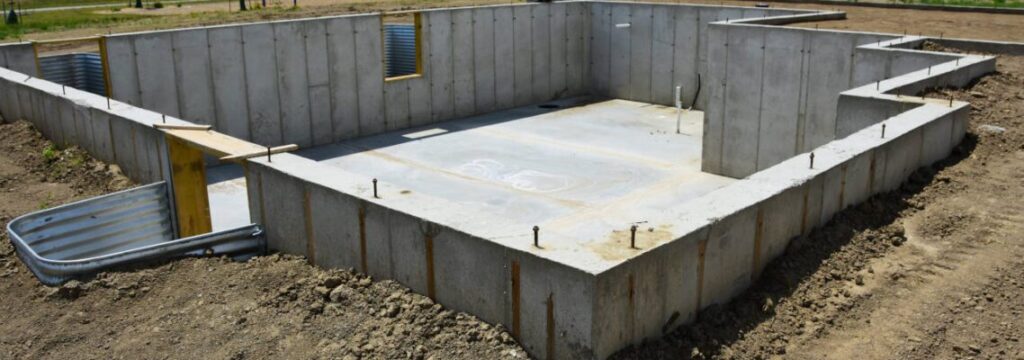
Benefits of Using a Basement Foundation Cost Calculator
Using a basement foundation cost calculator can provide significant advantages when planning and budgeting for your basement construction. These tools can help you make more informed decisions, reduce unexpected costs, and streamline the entire planning process.
Accurate Budget Planning
One of the main benefits of using a basement foundation cost calculator is the ability to generate a precise estimate of the total cost for your project. By inputting your specific project details—such as the size of the basement, location, and type of foundation—you can receive a more accurate picture of the overall expenses.
- Clear Estimates: Calculators allow you to input various factors, ensuring that you account for all necessary components, including excavation, materials, labor, and additional costs like waterproofing.
- Avoiding Over or Under Budgeting: By having a clear idea of the costs upfront, you can avoid surprises and ensure that your budget aligns with the project’s needs.
Comparing Different Foundation Options
A basement foundation cost calculator often allows you to explore different foundation types and compare their costs side-by-side. This feature can help you choose the most cost-effective option that suits your requirements.
- Foundation Type Comparisons: Whether you’re considering a full basement, walkout, or partial basement, the calculator lets you easily compare the costs of each type to determine which is the most feasible for your space and budget.
- Informed Decision Making: Understanding the cost differences between foundation types helps you choose the best solution without compromising on quality or durability.
Adjusting for Local Market Rates
Foundation costs can vary greatly depending on location, as labor rates, material costs, and regulations differ from one region to another. A basement foundation cost calculator can factor in local market conditions to give you a more accurate estimate based on where you’re building.
- Location-Specific Adjustments: By entering your zip code or city, the calculator can account for local labor and material costs, including fluctuations due to regional demand or availability of certain materials.
- Understanding Regional Variations: With this feature, you’ll get a tailored estimate that reflects real-world costs in your area, helping you avoid underestimating or overestimating the expenses based on generalized pricing.
Using a basement foundation cost calculator helps you stay in control of your project, offering an easy way to get reliable estimates, compare foundation types, and adjust for local costs—ultimately making your basement construction more efficient and cost-effective.
How to Use the Basement Foundation Cost Calculator
Using a basement foundation cost calculator is a straightforward process, but understanding what factors influence the estimate is key to getting accurate results. By following a few simple steps, you can estimate the cost of your basement foundation and make informed decisions for your project.
Input Requirements (Size, Soil Conditions, etc.)
To get the most accurate estimate from the basement foundation cost calculator, you need to provide specific project details. Here are the main input requirements:
- Basement Size: The size of your basement (in square footage) is one of the most important factors influencing the overall cost. Larger basements typically cost more due to increased labor and materials.
- Soil Conditions: Soil type and stability affect excavation and foundation work. For example, rocky or clay-heavy soil may require more extensive excavation and preparation, raising the cost.
- Foundation Type: Whether you’re building a full basement, walkout, or partial basement, the calculator will need to know the type of foundation you’re opting for, as this affects material and labor costs.
- Location: Your region’s specific cost factors, including labor rates, material costs, and building codes, will be taken into account by entering your location.
How the Calculator Estimates Costs
The calculator uses the information you provide to generate an estimate based on current market rates. It typically breaks down the total cost into components such as:
- Labor and Materials: Costs for labor, including excavation, concrete pouring, and installation of rebar or steel reinforcement.
- Excavation and Site Preparation: If significant excavation is required, the cost will be factored in, including grading, soil removal, and preparation.
- Foundation Type: Depending on the complexity of your chosen foundation, such as a walkout or full basement, costs can vary significantly.
The calculator then adds these estimates to give you an approximate total for your foundation project.
Adjusting the Results for Local Factors
One of the main advantages of using a basement foundation cost calculator is that it can adjust estimates based on your local conditions. After entering your project details, the tool can modify the results to account for:
- Regional Material Costs: Some materials, like concrete and rebar, can be more expensive in certain areas due to availability or transportation fees.
- Labor Rates: Labor costs can vary depending on where you’re building, with certain regions having higher or lower wages for skilled workers.
- Local Building Codes and Permits: The calculator can consider local regulations and fees for permits, which can add additional costs to your project.
Expert Tips for Reducing Basement Foundation Costs
While basement foundation costs can add up quickly, there are several ways to reduce expenses without sacrificing quality. Here are expert tips to help you save money while still achieving a solid and durable foundation.
Planning and Preparation
Effective planning is essential for reducing costs. Thoroughly prepare for the project by:
- Getting Multiple Quotes: Consult with several contractors to compare pricing and services. This will allow you to choose the best value while ensuring quality.
- Designing Efficiently: The simpler the design of your basement, the more cost-effective it will be. Avoid overly complex layouts that may require more specialized work.
- Site Assessment: Have the site properly assessed before beginning excavation. Addressing any potential issues like soil instability or drainage concerns before work begins can prevent costly delays.
Hiring the Right Contractors
Choosing the right contractors is one of the most important steps in keeping costs down. Look for:
- Experienced Contractors: Hiring a contractor with experience in basement foundations ensures high-quality work, reducing the likelihood of issues down the road.
- Local Experts: Local contractors are often more knowledgeable about regional building codes and soil conditions, which can help minimize unexpected costs.
- Check References and Reviews: Ensure the contractors you hire have good reviews and references, indicating they can deliver quality work within budget.
Avoiding Common Basement Construction Mistakes
Avoiding costly mistakes during basement construction can save you time and money. Common mistakes include:
- Underestimating Excavation Costs: Not properly assessing the soil and excavation needs can lead to unexpected additional costs during construction.
- Skipping Proper Waterproofing: Waterproofing is crucial for long-term basement durability. Cutting corners in this area can lead to leaks and foundation problems, resulting in expensive repairs.
- Ignoring Local Regulations: Failing to meet local building codes or not obtaining necessary permits can result in fines and delays, adding unnecessary costs to your project.
By following these expert tips, you can ensure that your basement foundation is built efficiently and within budget, without compromising on quality or safety.

